|
If the European soccer season ended today, there would be only one repeat champion among Europe's top seven leagues. Liverpool lead annual Premier League champions Manchester City by a point -- conveniently, the two teams play this Sunday. Bayer Leverkusen, unbeaten in all competitions, lead 11-time defending Bundesliga champs Bayern Munich by a jarring 10 points with 10 matches to go. After ceding LaLiga back to Barcelona last season, Real Madrid now lead the league by seven. After slipping to third while Napoli ran away with Serie A in 2022-23, Inter Milan are on pace for 100 points and lead Juventus by 15 points (and last season's champs, Napoli, by 29). In Portugal, Sporting CP have responded to a rare fourth-place finish by surging back to first, one point ahead of Benfica with a game in hand. And a year after losing to Feyenoord by seven points, PSV are unbeaten in league play and lead by 10. Only nearly-annual Ligue 1 champions Paris Saint-Germain are positioned to repeat. Aside from Leverkusen, of course, none of these teams are exactly upstarts. Still, repeats are the name of the game in this sport -- Bayern have won 11 straight Bundesliga titles, Manchester City have won five of six Premier Leagues, Juventus recently won nine straight Scudettos, PSG have won nine of 11, et cetera -- and with the way things have taken shape heading into the season's stretch run, we could end up a bit short of them. While it's obviously far too early for any sort of "Why did the incumbents fall apart?" retrospective -- after all, some of them haven't actually fallen apart yet -- we can at least take a moment to talk about how the new leaders (and PSG) have reached the top of the table at this point in the year. What are the stats and trends behind the biggest leagues' leaders?
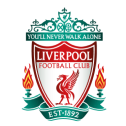 Liverpool, English Premier League Liverpool, English Premier League
We'll start with the team that likely has the most work left to do. The Premier League has a genuine three-way race at this point in the season for the first time since 2009-10; that one became a two-team race (Carlo Ancelotti's Chelsea over Manchester United by one point) when Arsenal fell apart late, and maybe the same thing will happen here. But right now, all three contenders have major reasons for hope. Liverpool have the most points, Arsenal have the best goal and xG differentials (which is a general portend of who might end up with the most points in the future) and Manchester City have, well, recent history on their side. Liverpool have been both lucky and unlucky at this point. Jurgen Klopp's final Reds team has a goal differential of +39 despite an xG differential of just +27.6; only Tottenham Hotspur have overachieved by more in that regard. But that good fortune has simply offset the poor fortune of their extreme run of injuries. Starters Trent Alexander-Arnold, Diogo Jota, Joël Matip and Alisson are out, as are a smattering of rotation players such as midfielder Ryan Gravenberch, and this is actually an improvement -- others such as Mohamed Salah and Dominik Szoboszlai are back in the rotation after recently missing time. No matter who has been on the pitch, however, Liverpool have been able to guarantee basically two things: They're going to take far more shots than their opponents, and they're going to work with far more urgency. The Reds rank second in the league in shots per possession and third in the league in shots allowed per possession. Only four of 27 league opponents have managed more shot attempts than them, and almost no one has outworked them. No one is allowing fewer passes per defensive action (PPDA, a common measure of defensive activity), no one is attempting a higher percentage of shots with only zero or one defender between shot and goal (19.5%), no one has produced a higher goal differential in what I call "transition possessions" -- possessions starting outside of the attacking third and lasting 20 or fewer seconds -- and only one team, Sean Dyche's ultra-direct Everton, is averaging fewer touches in the attacking third before attempting a shot. 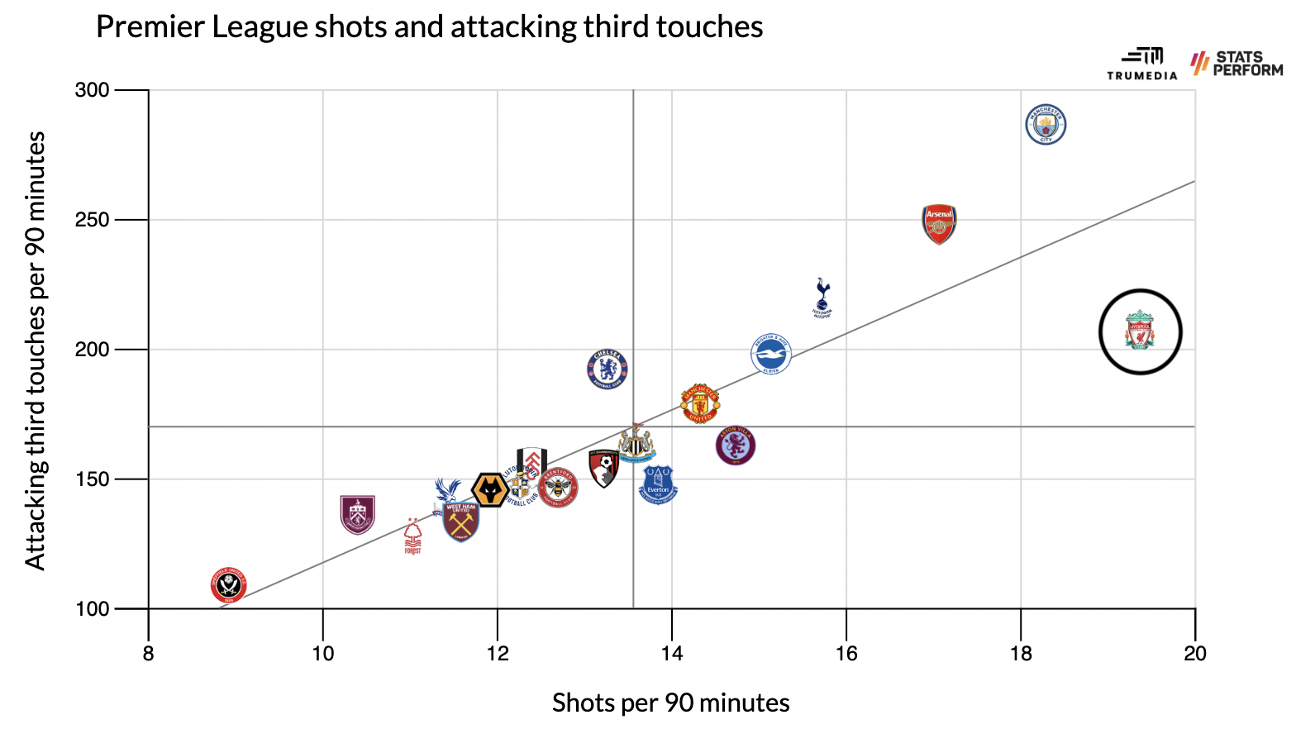 (Source: TruMedia)
(Source: TruMedia)
While Pep Guardiola's ultra-patient City average 15.7 attacking-third (A3) touches per shot, and Arsenal average 14.4, Liverpool average only 10.7. They've created 79 fewer A3 touches than City, but attempted more shots. Translation: No one tries harder to create a threat before the opposing defense has settled in. This urgency has had the predictable effect of wearing opponents out. It's no coincidence, in other words, that Liverpool also rank first in average goal differential over the last 30 minutes of a match (+0.96) and first in points per game in matches they've trailed (1.83). They've even overcome suffering the most red cards to still top the table (for now). Is all of this sustainable? Based on stats alone, it's hard to say yes. Over their past seven matches during this time of injury crisis, three opponents have generated shots worth more xG -- second-division Southampton in the FA Cup (1.8 xG to 1.6), Chelsea in the League Cup final (2.3 to 1.8) and Arsenal in a 3-1 league blowout back on Feb. 4 (3.5 to 0.4). They've been pretty fortunate to win six matches in a row in all competitions, in other words, even though they've also been unfortunate from an injury perspective. But the one thing you can completely control in this game is pure effort, and this inspired Liverpool team is likely to keep winning that part of the game no matter who's on the pitch.
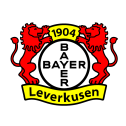 Bayer Leverkusen, German Bundesliga Bayer Leverkusen, German Bundesliga
One of the initial tenets of Pep Guardiola's managerial success was the "15-pass rule" -- he felt a team needed at least 15 passes in possession to both establish a proper offensive structure and position itself to counter-press and properly defend counter-attacks. Even if Guardiola's Manchester City sees a few more moments of directness in attempt to take advantage of Erling Haaland's speed and general brilliance, there's really no evidence that Guardiola's belief in the 15-pass rule has subsided these days. But the best evidence of the 15-pass rule currently rests with a former Guardiola protege. Xabi Alonso played for Guardiola for two seasons at Bayern Munich, and his Bayer Leverkusen squad has put itself on the brink of ending Bayern Munich's 11-year title run thanks to the glory of a relentless, short passing game: 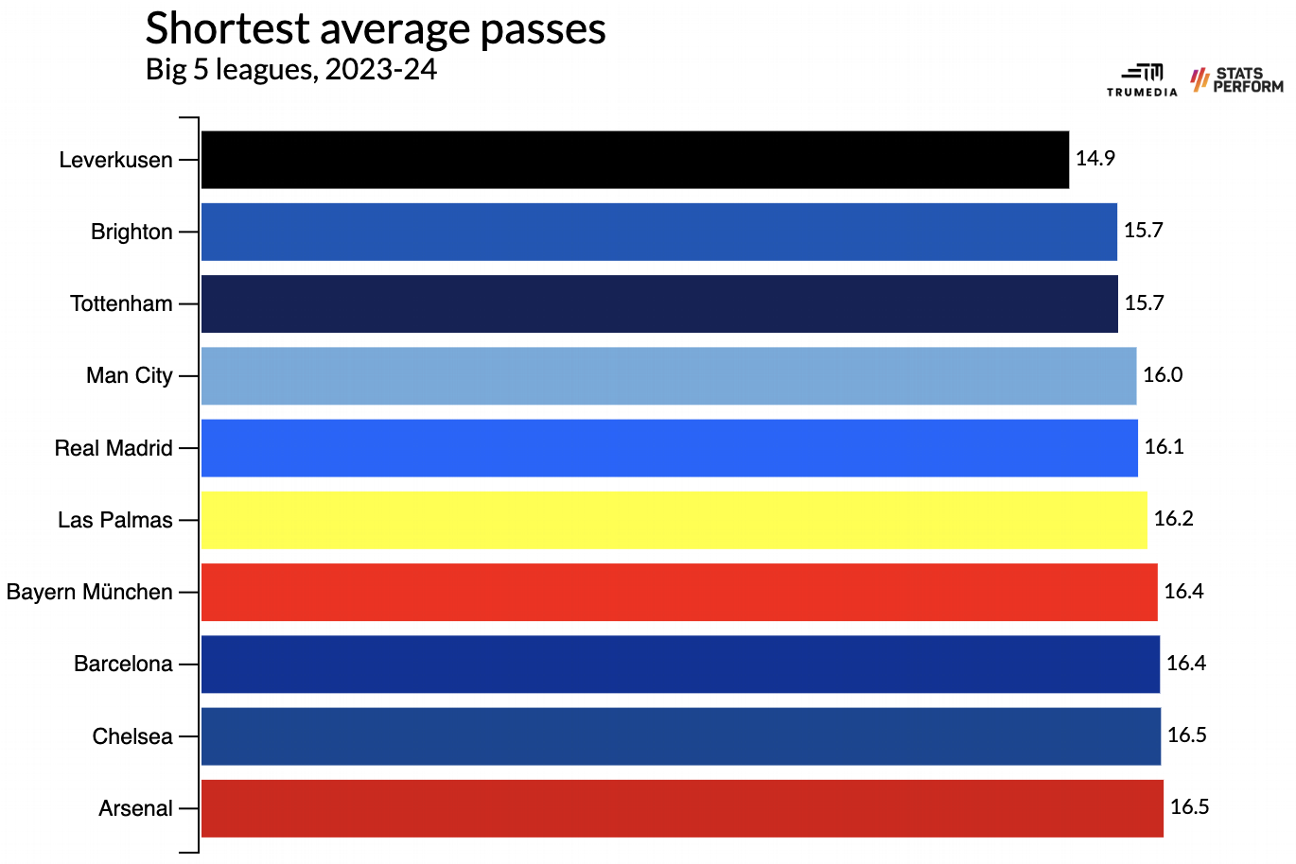 (Source: TruMedia. Chart measures average pass distance in meters)
(Source: TruMedia. Chart measures average pass distance in meters)
Leverkusen average far shorter passes than anyone in Europe's Big 5 leagues -- 1.1 meters per pass shorter than Guardiola's City and 1.5 shorter than Barcelona -- and that has led to a stranglehold in possession. Within the Bundesliga, they are first in possession rate (62.1%, ahead of even Bayern) and first in average passes per possession (7.5). This general patience has certainly created the desired effects in attack, where they are second in shots per possession and first in build-up attacks (sequences with 10 or more passes that end in a shot or a touch in the box). But it has also created by far the best transition defense in the league and one of the best in Europe. They counter-press beautifully, ranking first in goals from high turnovers and goals in transition possessions. Even when they don't get the ball back immediately, they prevent you from doing anything in transition. They have allowed only four goals from transition possessions, easily the fewest in the Bundesliga, and they swallow up scoring chances before they even start. Against Leverkusen, opponents average just 7.6 cross attempts per match, almost five fewer than the league average. They can't easily move the ball into dangerous areas on the outside, and even if opponents do work the ball into the attacking third, it takes them an average of 13.0 touches to generate a shot -- the highest mark in the league. Bayer Leverkusen give you no counter-attacking opportunities, and they force you to play as patiently as they do, knowing you probably can't. Aside from occasional moments of sterility in attack -- they rank only eighth in xG per shot -- Leverkusen have played nearly flawless ball this season. There's no wondering why Alonso appears to be the No. 1 candidate on the managerial replacement lists at both Liverpool and Bayern.
 Real Madrid, Spanish LaLiga Real Madrid, Spanish LaLiga
League status: 66 points from 27 games (11 games remaining) What the stats say: A dose of magic, and a refusal to give easy looks at goal
We're used to magic from Real Madrid. Carlo Ancelotti's squad won the Champions League two years ago thanks in part to game-winners in the 89th, 95th and 96th minutes. They scored three in 30 minutes to advance past PSG in the round of 16, scored two after the 80th minute to beat Chelsea in the quarterfinals, then scored in the 90th and 91st minutes against Manchester City in the semifinals before scoring the winner in overtime. It was an absurd run, but because of all the other magic Real Madrid have created through the years, it felt only so surprising. With a seven-point lead over Girona and eight over Barcelona, the Blancos are exceedingly likely to win their 36th LaLiga title in the coming weeks. Considering the injury epidemic they have dealt with -- ACL tears for goalkeeper Thibaut Courtois and defenders Éder Militão and David Alaba, not to mention lengthy time on the sidelines for winger Vinícius Júnior and others -- that is awfully impressive. They have once again put themselves in this position thanks to late-game brilliance. This season, Real Madrid have won Champions League games with goals in the 78th, 84th, 89th and 94th minutes, and they've somehow pulled 20 points from trailing positions in nine matches in league play. That's an average of 2.2 points per game while trailing; no one else in the Big 5 leagues has averaged more than 1.8, and only Bayer Leverkusen can top their average of 2.2 points per game in matches decided by 0-1 goals. Their primary superpower this season, however, hasn't been their clutch play -- it's been their abject refusal to give opponents anything easy. They're the only Big 5 team not to have allowed a goal from a set piece -- PSV has pulled this off in the Eredivisie as well -- and despite the myriad injuries in the back, they're allowing the fewest goals from high turnovers, too. 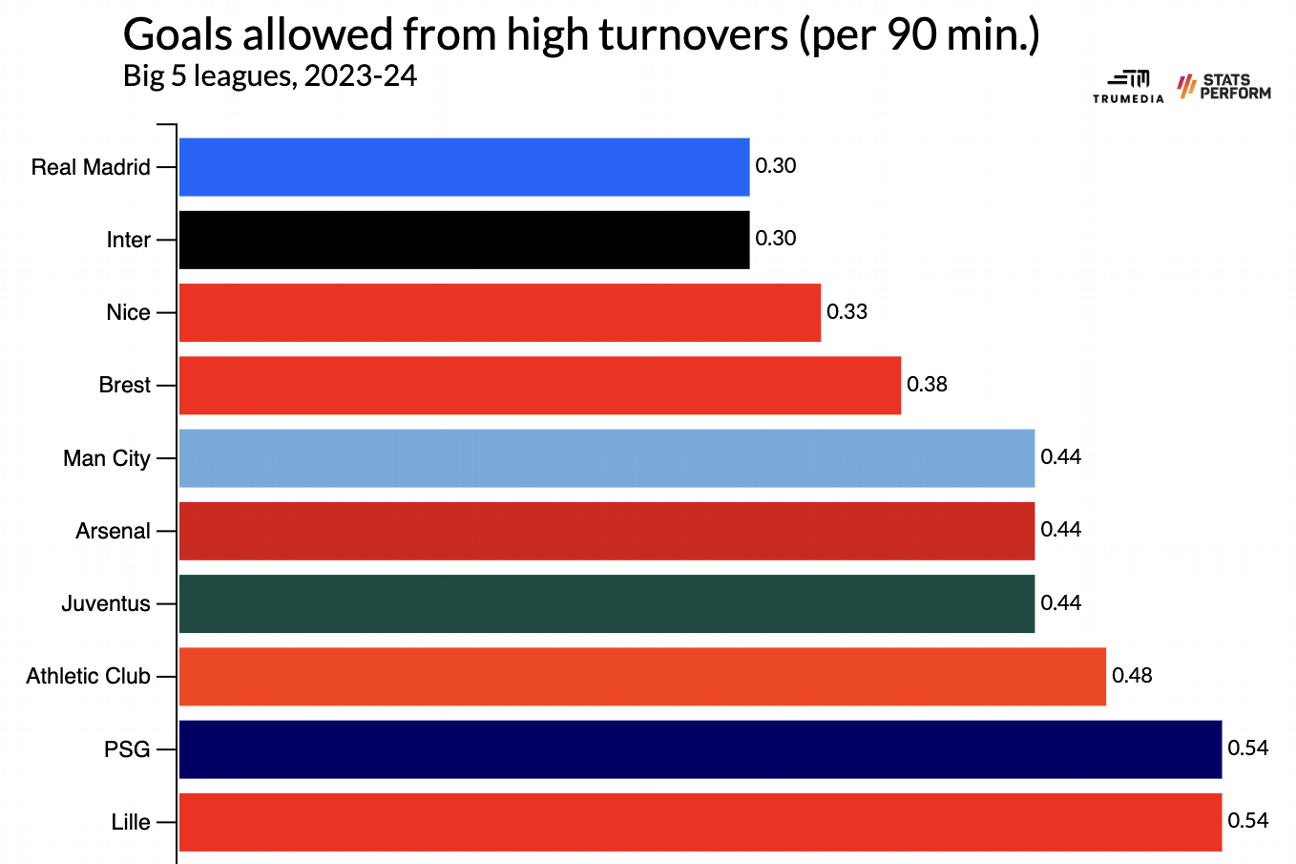 (Source: TruMedia)
(Source: TruMedia)
In all, Real Madrid have allowed only 18 goals in 27 league matches, easily the lowest in LaLiga; they've perhaps been a bit fortunate in this regard, as they're fifth in shots allowed per possession and third in xG per shot and have needed a league-best 77% save percentage from Courtois stop-gaps Andriy Lunin and Kepa. Just ask Barcelona (16th in save percentage) how things can go when your starting keeper has to miss significant time to injury. Still, the general calmness this team has established is remarkable even by Real Madrid standards. They give you nothing easy, and when things are closer than you think they should be late in the match, they strike you down.
 Inter Milan, Italian Serie A Inter Milan, Italian Serie A
We continue to underestimate Inter. They probably should have won the Champions League last season. (Here's your reminder that they doubled Manchester City's shot total in the final and generated 1.7 xG to City's 1.0.) They currently rank second in the Club Elo ratings ahead of even Liverpool, Arsenal and Real Madrid. They have won 12 matches in a row in all competitions, they haven't lost outright since September, and they're on pace for 101 points in league play, barely off of the 102-point Serie A record set by Juventus in 2013-14. No one makes better tactical use of his substitutions than Simone Inzaghi (who makes five subs per game with no exceptions), and no one makes better use of tactics than Inzaghi at this moment, either. Inter are an absolute wrecking ball. And yet, they are a distant No. 5 betting favorite in the Champions League at the moment, behind a Bayern Munich team desperately seeking confidence and an Arsenal team that trails Porto heading into its round-of-16 second leg. I'm not one to tell you how to spend your money -- I fear jinxes far too much for that -- but I'll just say that if I were setting those betting odds, they would look pretty different. When you're on a record pace, you're probably doing just about everything well, and that's certainly the case with Inter: They're first in Serie A in both shots per possession and xG per shot, and in defense they're fifth in shots allowed per possession and second in xG per shot. It's hard to pinpoint one thing they're doing particularly well, but let's highlight what really good transition play looks like: 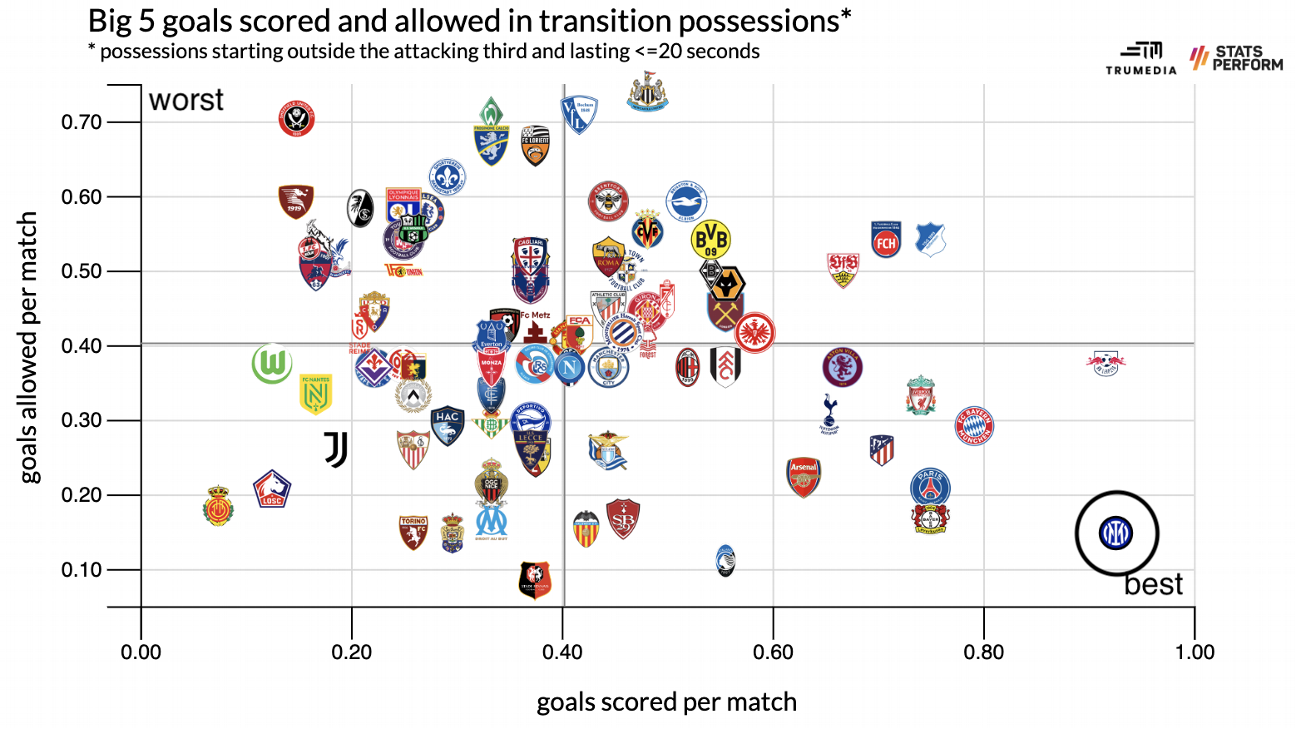 (Source: TruMedia)
(Source: TruMedia)
When it comes to transition attack, Inter are just about the best in Europe: They're basically Red Bull-esque. When it comes to preventing counters of any kind, they muck things up better than almost anyone, too. That seems like a rather unfair combination. For as good as the attacking trio of forwards Lautaro Martínez and Marcus Thuram and ageless midfielder Henrikh Mkhitaryan have been, they're even better in these quick-strike situations. They've combined for 40 goals, 17 assists and 105 chances created in all competitions and 15, 12 and 38 of them, respectively, have come from the transition possessions defined above. Inter can break you down when you're organized, but they're also just about the best team in the world when you're not.
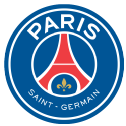 Paris Saint-Germain, French Ligue 1 Paris Saint-Germain, French Ligue 1
PSG's hire of Luis Enrique as manager this season was fascinating for a number of reasons. Generally, it's always interesting when someone with a rather strong and exacting personality takes the reins at a mega-club known for trying to sign mega-stars with their own strong personalities. Beyond that, though, Enrique is one of the sport's grand possession practitioners. In three league seasons with Barcelona, his squads averaged between 66-69% possession in league play. Spain averaged over 70% in his 47 matches in charge of the national team. The prototypical Enrique team is going to complete over 90% of its (mostly short) passes with a PPDA average in the single digits (which means steady and constant defensive pressure). Trying to pull off the 90%-and-single-digit-PPDA act at PSG, however, was going to be interesting. Granted, Luis Enrique didn't inherit the version of PSG that had the aging (or downright aged) Leo Messi and Neymar up front; attempting any sort of organized, full-length defensive pressure with them was going to be impossible. But it's still going to be tricky with Kylian Mbappé as your center of gravity because, no matter how young and fast he may be, Mbappe barely participates in defense. Here's Mbappe's current FBref.com percentiles chart, and it tells a pretty complete story: 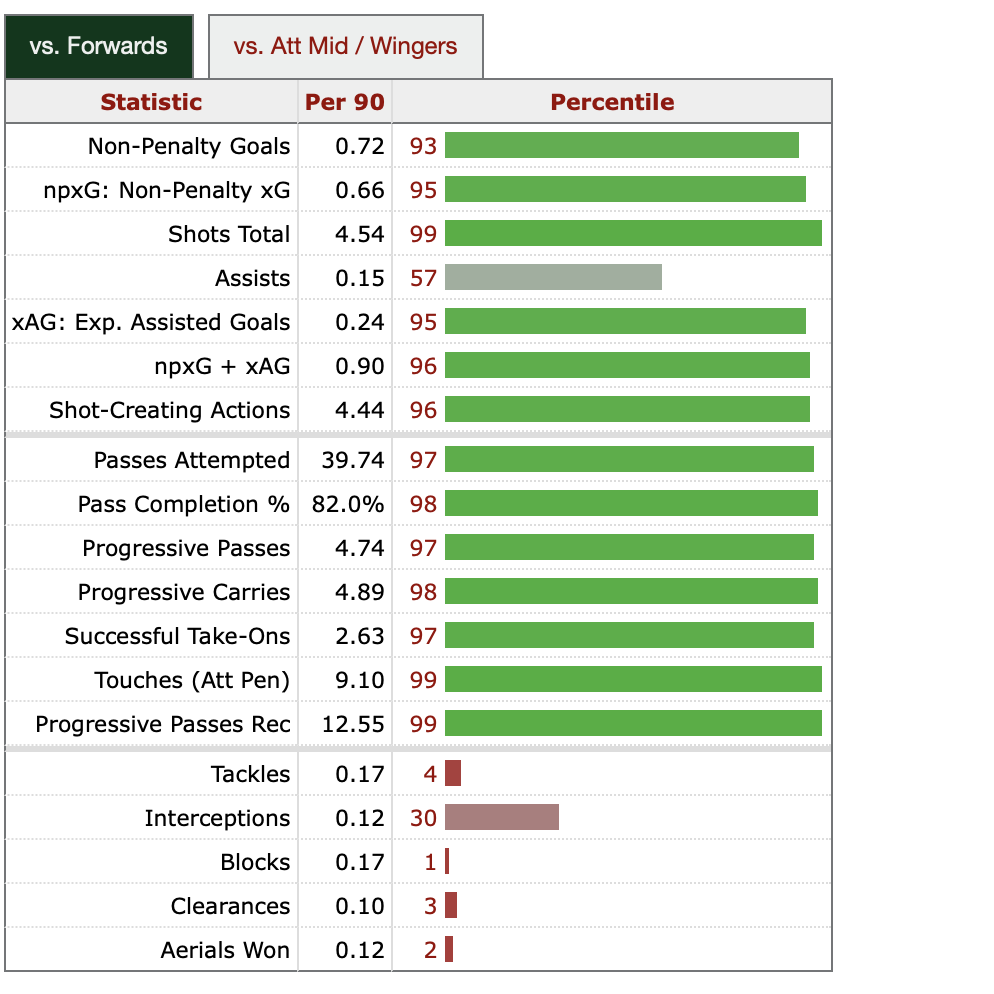 (Source: FBref.com; Player is compared to positional peers in Men's Big 5 Leagues, Champions League and Europa League over the last 365 days, based on 3,628 minutes played. Percentiles are compared to all forwards.)
(Source: FBref.com; Player is compared to positional peers in Men's Big 5 Leagues, Champions League and Europa League over the last 365 days, based on 3,628 minutes played. Percentiles are compared to all forwards.)
There might not be a more dangerous ball progressor in the world than Mbappe ... and he's one of the most elite scorers, too. In more of a counter-attacking system like the one deployed by France national team manager Didier Deschamps, he has a chance to create countless terrifying, open-field attacks. But again: He's not going to contribute much, if any, pressure. He is like a mid-30s Messi or Cristiano Ronaldo in that regard. Can you create a proper Luis Enrique system, then, when you're going to have nine players at most participating in defense? As it turns out, yes! 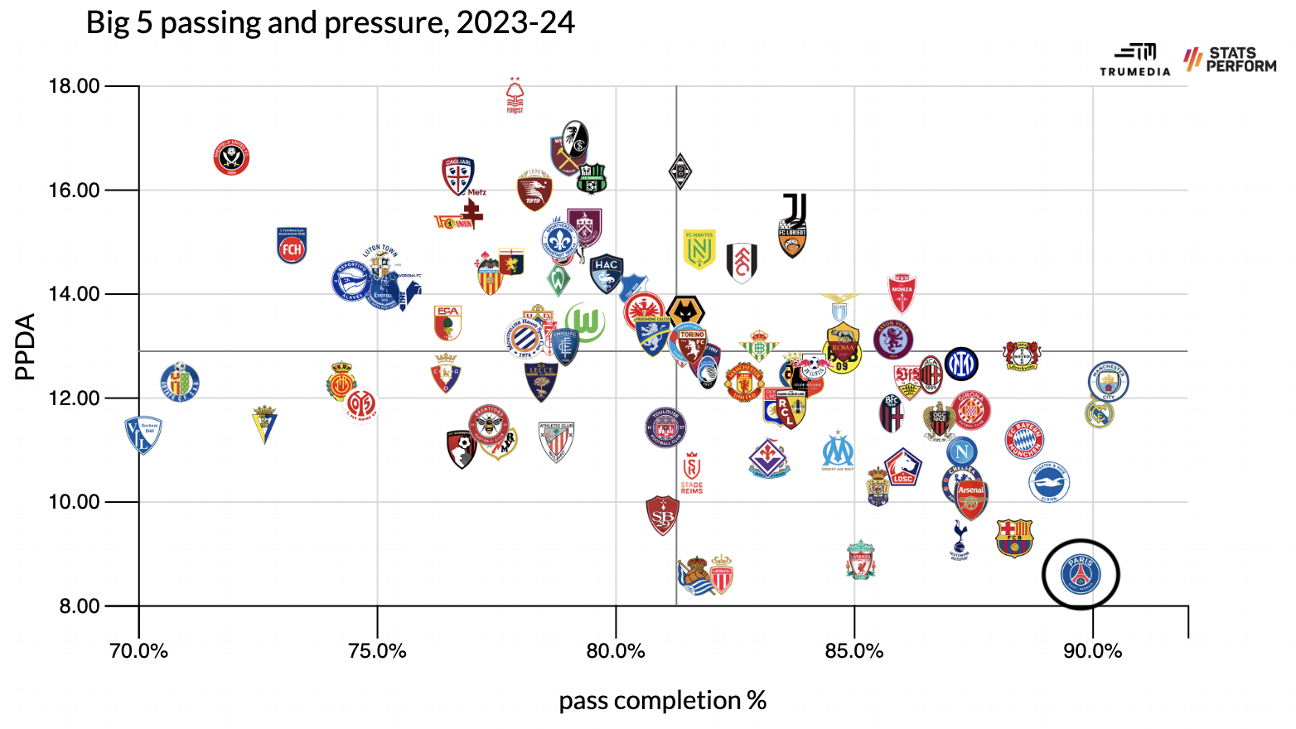 (Source: TruMedia)
(Source: TruMedia)
In Europe's Big 5 leagues, there are currently seven teams allowing under 10 passes per defensive action. Only one of them is also completing 90% of its passes (at least if you round up from 89.8%), and it's the one coached by Luis Enrique. Despite losing the raw star power of both Messi and Neymar, PSG are on pace for their highest point total in league play since 2018-19, Mbappe's second at the club. That PSG are cruising to a Ligue 1 title is a surprise to no one. But the fact that they've so seamlessly shifted to life as a Luis Enrique team has been impressive all the same.
 Sporting CP, Liga Portugal Sporting CP, Liga Portugal
Portugal's three power clubs -- Benfica, Porto and Sporting -- have basically traded the league title back and forth for a while. There hasn't been a repeat champion since 2017, and each of these clubs has one title in the past three seasons. Of the league's combined €1.36 billion in current market value at Transfermarkt, these three clubs are responsible for 68% of it by themselves. Sporting have made what is occasionally a Big Two a definitive Big Three of late, and they are currently fending off Benfica by simply creating certainty at all times. Almost no one in Europe dominates the boxes more than Ruben Amorim's squad -- they have commanded 76% of all touches in the defensive box this season; in the top seven leagues (the Big 5, plus Portugal and Netherlands), only Feyenoord (78%) has more -- and almost no one more thoroughly dominates the first 60 minutes of a given match: 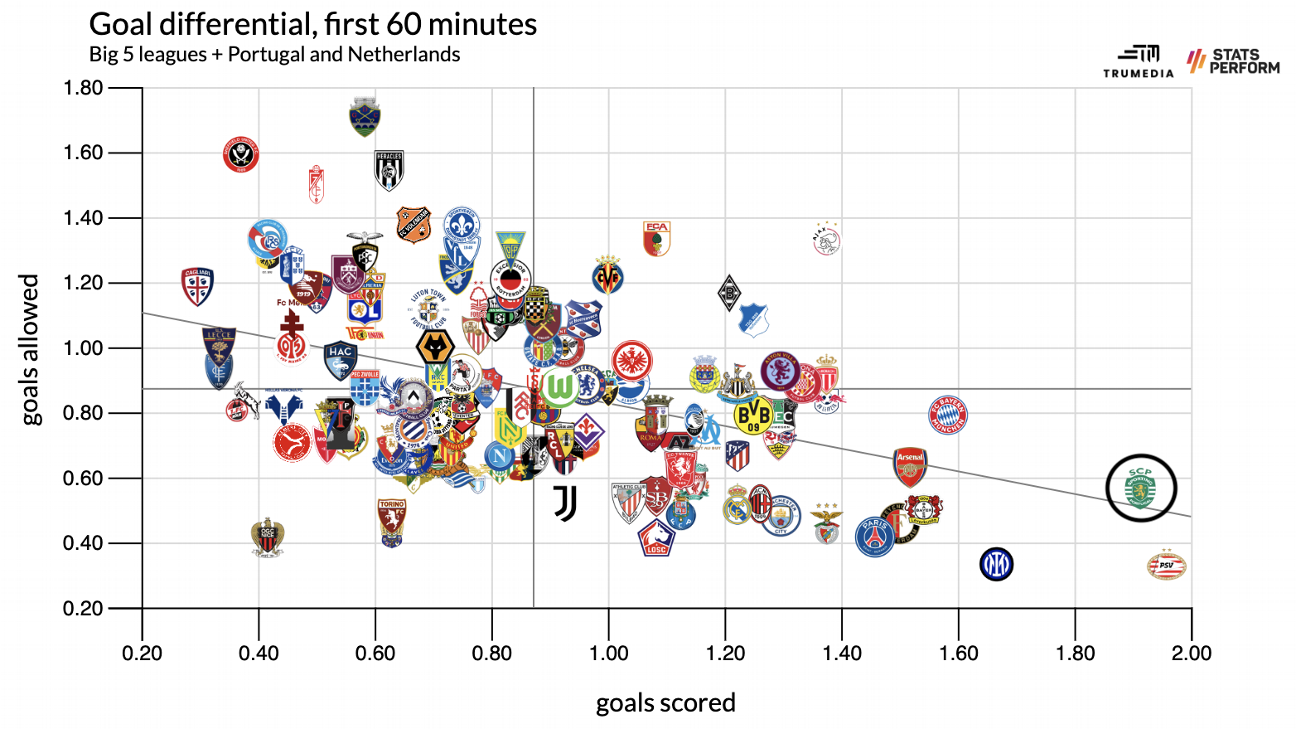 (Source: TruMedia)
(Source: TruMedia)
Late-game heroics are thrilling -- just ask Liverpool and Real Madrid -- but nothing's more effective than never even needing those heroics. If Sporting wins its second league title in four seasons, a pure lack of drama will be the primary reason why.
 PSV Eindhoven, Dutch Eredivisie PSV Eindhoven, Dutch Eredivisie
Peter Bosz's managerial career has been thoroughly ... decent. He wins just enough to continue getting solid job offers, and he disappoints just enough that he's only lasted more than 60 matches (or a season-and-a-half) in one of his last four gigs. But at PSV he has found the almost perfect personnel -- offensive-minded fullbacks Jordan Teze and Sergiño Dest, deep-lying playmaker Joey Veerman, goal poacher Luuk De Jong -- for executing the extreme attacking style he prefers. In 38 matches this season, PSV have lost only twice, and they're unbeaten in league play. Their 79 goals are 19 more than anyone else in the always-prolific Eredivisie, and their 13 goals allowed are the fewest by six. Feyenoord have a better goal differential and nearly the same points pace as they had last year when they won the league, but PSV have left them in the dust. Like Sporting, PSV are just leaving nothing to chance. No one in Europe's top seven leagues comes close to their shot volume, and almost no one allows fewer shots: 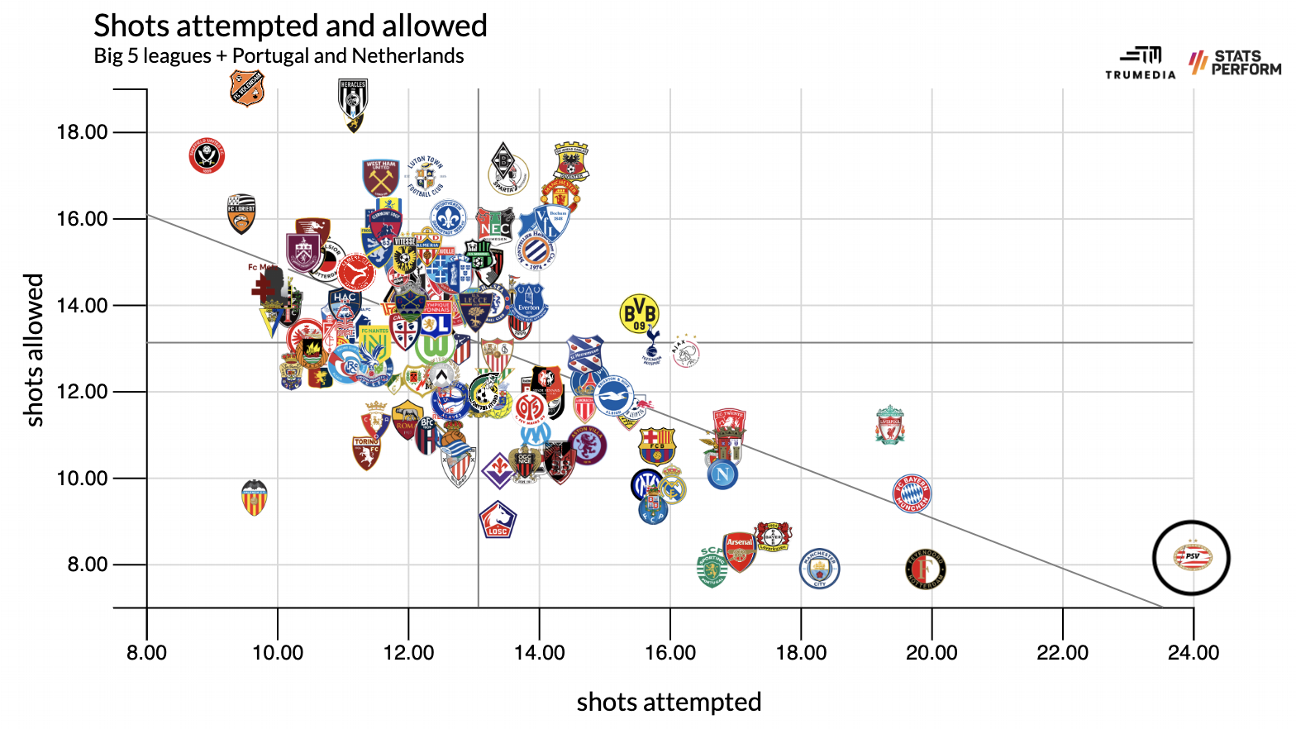 (Source: TruMedia)
(Source: TruMedia)
Generally, "take all of the shots and give your opponents none of them" is a pretty good way to win games. It should end up driving PSV's first league title in six years, and with a positive trip to Dortmund next week it could also net their first Champions League quarterfinal appearance since 2007.
|

